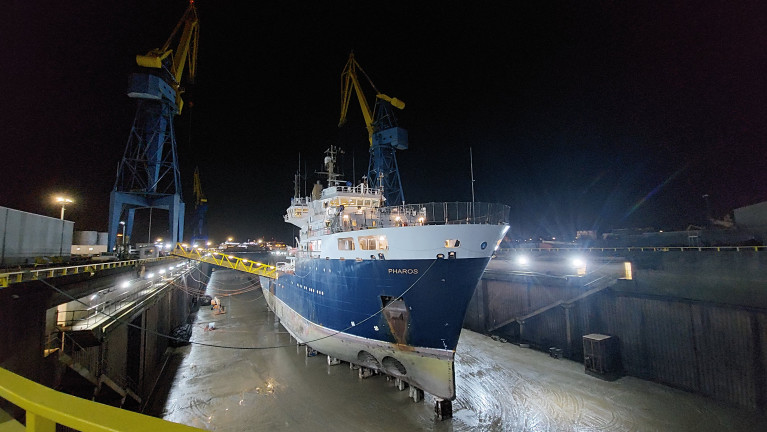Displaying items by tag: Dry docking
Northern Lighthouse Board's Aids to Navigation Tender Dry-Docks for 'Special Survey' at H&W Belfast Shipyard
Northern Lighthouse Board’s aids to navigation vessel NLV Pharos which operates in Scottish waters, is currently at Harland & Wolff's Belfast shipyard for a scheduled dry-docking which happens twice in a 5 year-period, writes Jehan Ashmore.
Commenting to Afloat, Mike Bullock, Chief Executive of the Northern Lighthouse Board said "this is NLV Pharos’ year 15 ‘Special Survey’ which means the ship is receiving a class survey and recertification. The maintenance work includes complete overhaul and bearing change of the main azimuth propulsion units and tunnel thrusters, crane overhaul and preservation and painting of the hull".
Pharos' primary role is to respond to wrecks and new navigational dangers, as the vessel supports the maintenance and refurbishment of NLB’s 200 plus lighthouses as well as conducting buoy operations.
To assist operations, Pharos is equipped with a helicopter pad, dynamic positioning (DP), a 30 tonne crane and a hydrographic survey suite.
The 2007 built NLV Pharos is homeported in Oban, west Scotland from where the vessel along with the smaller NLV Pole Star (see replacement story) works from this base in addition to serving in Isle of Man waters.
Technical operations are also carried out at Oban which provides maintenance workshops and facilities for the construction of buoys and beacons.
In addition to the Oban base, technicians are located in Inverness, Orkney and Shetland. As for the headquarters of NLB, they are located in Edinburgh with a staff of 80 personnel.
The NLB is one of three General Lighthouse Authorities (GLA's) as Trinity House is the authority for waters off England, Wales and Gibraltar. Whereas the Commissioners of Irish Lights is responsible for all waters off the coast of Ireland.





























































